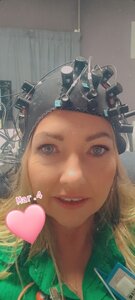As I said, not till sometime this March.So they weren't able to analyze your tinnitus?
The Bionics Institute Claim They Have Found a Way of Objectively Measuring Tinnitus
- Thread starter Ed209
- Start date
More options
Who Replied?Oh ok, sorry, that email you posted confused me.As I said, not till sometime this March.
Just dropping a note to say thanks to @DebInAustralia for keeping us up-to-date. 
Also, great photo! They fitted you with a pretty nifty cap. Are you allowed to tell us how long it took to take the test?

Also, great photo! They fitted you with a pretty nifty cap. Are you allowed to tell us how long it took to take the test?
Star64
Member
The Bionics Institute is still actively seeking people with tinnitus to take part in their Research here in Melbourne hopefully more people are able to attend as our COVID-19 restrictions ease.
I managed to catch the train into our city today to meet with Mehrnaz and complete the tests required. First up was a hearing test and then the brain imaging technique called functional near-infrared spectroscopy (fNIRS) was undertaken, this took around 30 minutes to complete.
Mehrnaz explained everything in detail and the test is totally non invasive. The Institute is also working on a drug to restore hearing but the time line for this is about 5 years. I will add links below if anyone is interested in reading more.


Photos of my COVID-19 safe train trip today
I managed to catch the train into our city today to meet with Mehrnaz and complete the tests required. First up was a hearing test and then the brain imaging technique called functional near-infrared spectroscopy (fNIRS) was undertaken, this took around 30 minutes to complete.
Mehrnaz explained everything in detail and the test is totally non invasive. The Institute is also working on a drug to restore hearing but the time line for this is about 5 years. I will add links below if anyone is interested in reading more.


Photos of my COVID-19 safe train trip today

This isn't related to the Bionics Institute but is about measuring tinnitus. The Hearing Health Foundation is hosting a webinar on April 19, 5PM EST, titled Measuring Tinnitus and Reactions to Tinnitus. The synopsis for the webinar is:
"Tinnitus, the experience of hearing sound without an external, acoustic source, can be measured. Measurements can productively inform the counseling process and guide adjustments of hearing aids and tinnitus sound therapy devices. Tinnitus does not present the same for everyone, and measurements illuminate different causes, symptoms, and potential treatments."
I read that they are working on adding something called optogenetics to existing cochlear implants thus making them even better.
They are (researchers)! It's really interesting technology. It's not so much that they are retrofitting existing CIs, it's that they are developing entirely new light based CIs that don't rely on the limitations of electrodes. The "genetics" part is because they plan on locally inserting a gene to help neurons read "light" as sound.I read that they are working on adding something called optogenetics to existing cochlear implants thus making them even better.
Would that not only improve speech intelligibility but range of frequencies covered by the new CI? I know that the range currently isn't too broad.They are (researchers)! It's really interesting technology. It's not so much that they are retrofitting existing CIs, it's that they are developing entirely new light based CIs that don't rely on the limitations of electrodes. The "genetics" part is because they plan on locally inserting a gene to help neurons read "light" as sound.
It would. It could stimulate continuously frequencies vs select interspersed regions with electrodes.Would that not only improve speech intelligibility but range of frequencies covered by the new CI? I know that the range currently isn't too broad.
I keep thinking about this but wouldn't a future bionic ear that can replicate the human ear with HD quality be optimal, and stem cells would be used to regenerate nerves and neurons in people who have damage making them eligible for such an ear or is this science fiction?It would. It could stimulate continuously frequencies vs select interspersed regions with electrodes.
The Bionics Institute is not only looking into the CI improvements but also does look into things like drugs to restore hair cells or synapses etc.I keep thinking about this but wouldn't a future bionic ear that can replicate the human ear with HD quality be optimal, and stem cells would be used to regenerate nerves and neurons in people who have damage making them eligible for such an ear or is this science fiction?
This is the organisation that got founded by Graeme Clark who invented the devices utilised by Cochlear.
A bionic ear is what a cochlear implant is and yes they are definitely working to make them better, including trying to infuse BDNF (for instance) at the time of implantation for better nerve integration and the development of optigenetic devices.I keep thinking about this but wouldn't a future bionic ear that can replicate the human ear with HD quality be optimal, and stem cells would be used to regenerate nerves and neurons in people who have damage making them eligible for such an ear or is this science fiction?
Koz
Member
- Dec 15, 2013
- 153
- Tinnitus Since
- 2009
- Cause of Tinnitus
- Unilateral sensorineural hearing loss
This is exciting but also not something I'm as keen on in comparison to non-surgical treatments for the inner ear. I hope one or more of the current crop of treatments in research for hair cell regrowth works to show the way that regenerative biology works and is the way forwards rather than implants.They are (researchers)! It's really interesting technology. It's not so much that they are retrofitting existing CIs, it's that they are developing entirely new light based CIs that don't rely on the limitations of electrodes. The "genetics" part is because they plan on locally inserting a gene to help neurons read "light" as sound.
PacNeuroSci
Member
- Mar 21, 2021
- 1
- Tinnitus Since
- 1984
- Cause of Tinnitus
- Military Noise/head trauma exacerbated by benzodiazpine drug
This thread has thousands of views, but nobody decided to financially support The Bionics Institute's tinnitus research. So sad.
https://www.bionicsinstitute.org/Appeal/tinnitus-appeal
https://www.bionicsinstitute.org/Appeal/tinnitus-appeal
I'm not motivated to donate to them because they already have lots of money. If they wanted to fund the tinnitus program, they could already fund it, but instead they want tinnitus sufferers' money, many of whom are unemployed or on sick leave. I grabbed the below from their Annual Report.This thread has thousands of views, but nobody decided to financially support The Bionics Institute's tinnitus research. So sad.
Sorry for delay.Are you allowed to tell us how long it took to take the test?
I was there for about 2 hours, but the actual test was about 45 minutes...
Are they developing treatments too? I thought they were only measuring tinnitus.
AfroSnowman
Member
- Jul 23, 2019
- 1,087
- Tinnitus Since
- 04/2019
- Cause of Tinnitus
- Nonnatural energy source
Wow. There is something so satisfying, if not useful, about actually getting an objective statement confirming that what you are experiencing is real, significant, and different than the tinnitus most people get.
Wow. There is something so satisfying, if not useful, about actually getting an objective statement confirming that what you are experiencing is real, significant, and different than the tinnitus most people get.
Yes, very interesting. I'd like to get an assessment myself. @DebInAustralia - have you done a THI or TFI and if so, what was your score?
I want to participate too!Hey, what's up with these guys? I read on their website they are developing hearing loss restorative drugs along with nanobot delivery methods and by default restoring hearing will help tinnitus, but I haven't heard anything from them in a while.
I'd like to be in the first trial please.
Here's more information and background on Bionics Institute's hearing restoration program:
https://www.bionicsinstitute.org/restoring-hearing
This could be a game-changer if it works well to deliver drugs like those from Otonomy and Frequency Therapeutics.The technology is based on a unique method of delivery that 'loads' the drug into tiny particles (nanoparticles) created through nano-engineering. This medical breakthrough will enable the delivery of drugs to the hard-to-reach inner ear, at levels that are safe and effective.

The Bionics Institute say they are developing a drug for hearing loss.
Do you know what Phase it is in, what type of molecule it is, and what is the mechanism of action?
Do you know what Phase it is in, what type of molecule it is, and what is the mechanism of action?

 Member
Member